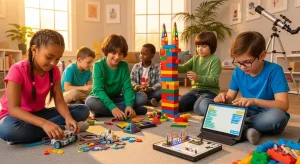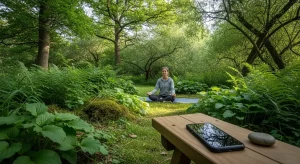Parenting in today’s world isn’t just about bedtime stories and lunchboxes—it’s about making conscious choices that impact your child’s future and the planet they’ll inherit. That’s where eco-friendly parenting comes in. This lifestyle focuses on reducing waste, making sustainable choices, and nurturing a child with environmental awareness.
Whether you’re a new parent or looking to green up your routine, these green parenting tips will help you raise your children in harmony with the Earth.
Why Eco-Friendly Parenting Matters
Sustainable parenting goes beyond reusable diapers—it’s about adopting values of conservation, responsibility, and mindfulness. Here’s why it matters:
Reduces your family’s carbon footprint
Minimizes exposure to harmful chemicals
Saves money long-term through reusables
Instills eco-conscious values in children
Supports a cleaner, safer environment for all
In short, eco parenting choices today lay the foundation for a better tomorrow.
Emotional Intelligence in Children: Why It Matters and How to Nurture It
Top Eco-Friendly Parenting Practices
1. Choose Reusable Over Disposable
The average baby uses over 6,000 diapers before potty training. Opting for cloth diapers can significantly reduce landfill waste.
Eco alternatives:
Cloth diapers with washable inserts
Reusable baby wipes
Bamboo or organic cotton bibs and clothing
2. Buy Sustainable Baby Products
Support ethical brands that use natural, non-toxic materials and eco-conscious packaging.
Look for:
| Product Type | Eco-Friendly Option |
|---|---|
| Diapers | Organic cotton or bamboo cloth diapers |
| Bottles | Glass or stainless steel baby bottles |
| Toys | Wooden, BPA-free, or recycled plastic toys |
| Clothes | GOTS-certified organic cotton apparel |
3. Breastfeed When Possible
Breastfeeding isn’t just beneficial for babies—it’s environmentally friendly. It requires no packaging, transportation, or manufacturing.
If breastfeeding isn’t an option, choose formula brands with sustainable sourcing and recyclable packaging.
Creating a Sustainable Home Environment
4. Reduce Plastic and Waste
Make zero-waste parenting a goal. This includes:
Bulk buying snacks and baby foods
Using glass storage jars instead of plastic containers
Avoiding individually wrapped baby items
Composting diapers if using biodegradable brands
5. Embrace Secondhand and Minimalism
Kids grow quickly, which means clothing, toys, and furniture are often short-lived. Consider:
Hand-me-downs from friends or family
Thrift stores or baby gear swaps
Toy libraries or rentals for seasonal play items
This reduces consumption and promotes a minimalist, eco-conscious family lifestyle.
Debt Reduction & Budget Planning: A Practical Guide
Raising Environmentally Aware Children
6. Teach by Example
Kids model what they see. If you recycle, reduce waste, and care about the Earth, they will too.
Let them sort recyclables with you
Grow herbs or vegetables in the garden
Talk about how your choices help the planet
7. Make Nature a Daily Teacher
Spending time outdoors not only boosts mental health—it helps kids connect with nature.
Ideas include:
Nature walks and scavenger hunts
Bird watching or bug collecting
Planting trees or flowers together
These activities reinforce the importance of environmental stewardship.
Eco-Friendly Parenting on a Budget
Going green doesn’t have to be expensive. In fact, eco-friendly parenting can help you save.
Budget-friendly sustainable parenting tips:
Use cloth napkins instead of paper towels
Replace paper books with digital or borrowed versions
DIY homemade baby food in reusable containers
Make your own natural cleaning products
The Rise of the Tip-Based Creator Economy
FAQ: Eco-Friendly Parenting
1. What is eco-friendly parenting?
Eco-friendly parenting refers to making conscious, sustainable choices in raising children that minimize environmental impact and promote a greener lifestyle.
2. Are cloth diapers really better for the environment?
Yes. Cloth diapers significantly reduce waste compared to disposables. When washed properly, they are more sustainable and cost-effective over time.
3. How can I raise my child to care about the environment?
Lead by example, involve them in eco-friendly activities, and encourage daily habits like recycling, gardening, and reducing waste.
Final Thoughts: Every Choice Counts
Parenting comes with endless decisions, and every small eco-friendly choice matters. By embracing a sustainable parenting lifestyle, you’re teaching your child that being kind to the planet is just as important as being kind to others.
The future belongs to our children—let’s raise them in a way that preserves the world they’ll live in.










